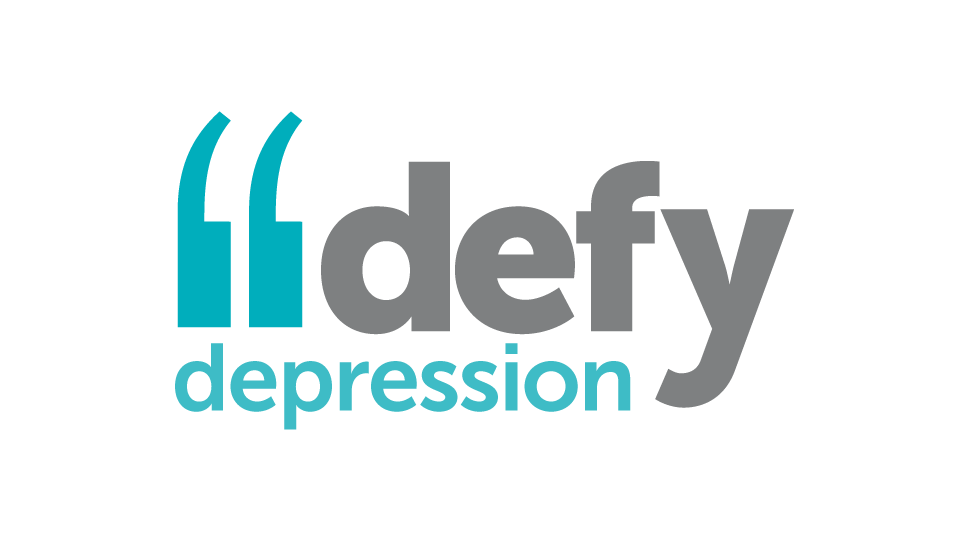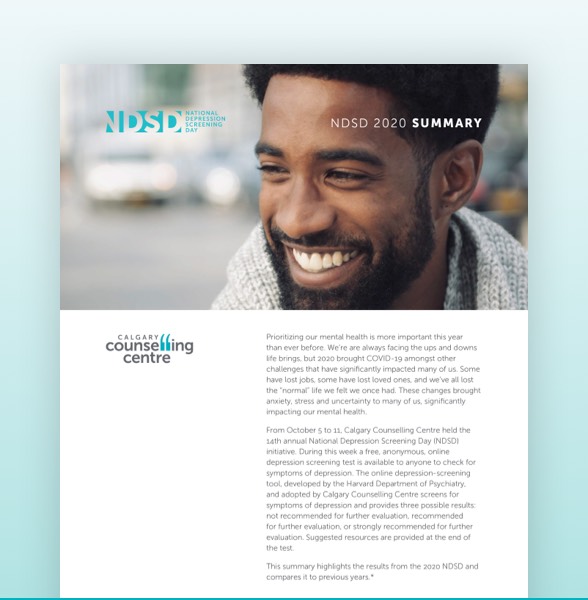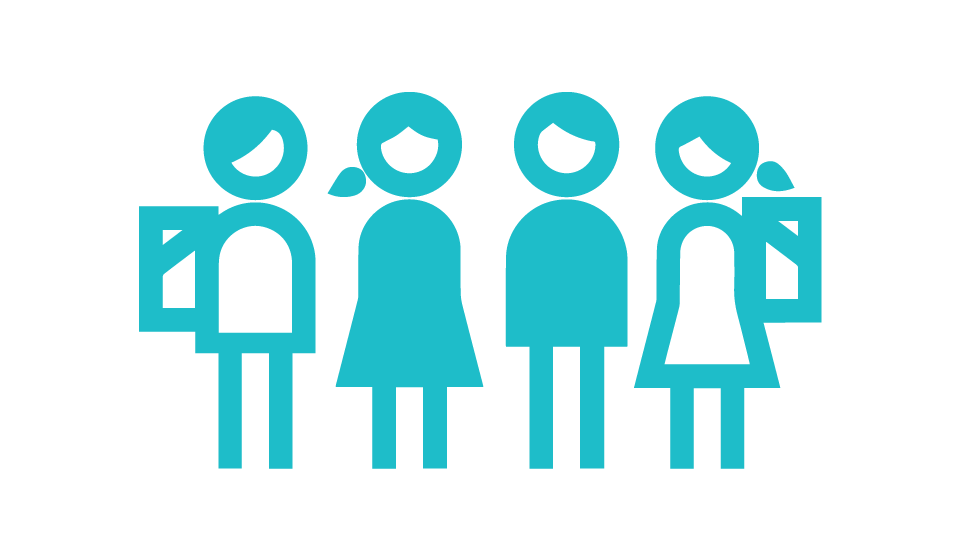
Our Pillars
Counselling
This past year may have changed the way we serve our clients, but not the quality of care they receive or the outstanding results they see from our services.
On March 16, 2020, public health measures were activated due to the COVID-19 pandemic. To ensure we could continue to serve our clients without any delays, CCC quickly transitioned all of our counselling services and group programs from in-person to online or over the phone. We continued to use our proven Feedback Informed Treatment (FIT) method which enables our counsellors and their clients to monitor the progress that is being made and make adjustments in treatment when necessary.
Clients and counsellors quickly adapted to the use of virtual technology using Microsoft Teams for counselling sessions resulting in the provision of 44,752 hours of counselling and group sessions in 2020.
Client outcomes from the start of the pandemic in mid-March through the end of the year dispelled many myths about virtual counselling. Results from counselling demonstrated that virtual counselling works as well as, if not better than in-person counselling. With most counselling sessions offered during the pandemic being online sessions, client outcomes exceeded those of previous years. Client feedback suggests that CCC clients valued the convenience, ease, flexibility, and timeliness that virtual counselling provided.
In order to better support and prepare our team of counsellors, we engaged Dr. Michael Yapko, a leading expert in depression, to offer a 12-hour training program through a series of live online workshops. Dr. Yapko’s training, followed with monthly virtual consultations and coaching, further prepared our counsellors to respond to what experts were calling the mental health pandemic brought on by COVID-19. In addition, CCC counsellors continued to consult with Dr. Scott Miller to explore and understand the use of FIT during a pandemic.
In late fall 2020, as we were entering the third wave of the pandemic our data was suggesting that our clients were experiencing higher levels of anxiety and uncertainty. With that knowledge, we engaged Lynn Lyons, MSW, a leading expert in anxiety to conduct a 12-hour training series to all counsellors, provided through virtual workshops on the treatment of anxiety.
The virtual training provided in 2020 grounded our counsellors and gave them increased confidence and support to work remotely in uncertain times with no clear endpoint to the pandemic.
Specialty areas
Wilson Centre for Domestic Abuse Studies

The Wilson Centre for Domestic Abuse Studies at Calgary Counselling Centre, named for the generosity of W. Brett Wilson and his family, is a vital resource for those in our community who are affected by domestic abuse. We partner with researchers from Universities across North America to learn how we can better support our clients who are impacted by domestic abuse.
CCC is a leader in the area of domestic abuse treatment and prevention. We provide counselling and group programs for all genders to those that are abusive in intimate relationships and to those that experience abuse. In addition to these services, we also collaborate with and guide other professionals on domestic abuse best practices. Our leadership was recognized in 2020 as Christine Berry, our Director of Family Violence Initiatives received the Alberta Government 2020 Inspiration Award for individual leadership in family violence.
Despite the many changes COVID-19 brought, we continued to serve our clients providing individual and group domestic violence treatment programs virtually. This alternate method proved to be effective and helpful to our clients. Our staff and students showed adaptability as we developed and implemented virtual processes to complete numerous domestic violence program protocols, forms, and risk assessments.
CCC participated in a provincial stakeholder meeting in August to discuss how to optimize virtual care for individuals experiencing domestic violence. Solutions to address the digital divide and increase access to technology, safe spaces and technology training were created. That work informed our consultations with local and provincial sources about working safely and effectively in this new reality.
In December, we attended an international conference focused on the latest research and best practices on parenting and domestic violence. The conference included representatives of Norway, United States, Finland, Israel, Switzerland, and Canada.
Our Male Domestic Abuse Outreach Program also successfully adapted to the new COVID-19 reality with the move to a virtual service delivery model, offering outreach services, counselling, and group therapy remotely by phone or online. We continue to address complex client needs by collaborating with other community service providers and conducting joint outreach meetings with clients to learn and integrate knowledge and share resources to better assist males who have experienced abuse.
Depression & Anxiety

Historically, anxiety and depression are the two most common reasons clients seeking counselling at CCC. In 2020 this continued to be the case with a notable increase in clients experiencing anxiety. Anxiety can often occur at the same time as depression. Although they each have their own causes, they do present similar symptoms.
Depression is a complex issue that affects individuals and those close to them. Each person struggling with depression impacts at least three other people and children of parents struggling with depression are more likely to also experience depression. CCC works strategically to engage family members in the counselling process as well as the person experiencing depression. We want to break the cycle of depression whenever possible and protect families by giving each family member problem-solving, decision making and discernment skills to help them achieve a better quality of life for themselves and their families.
In 2020, our counsellors and students were given the opportunity to participate in the online training, Treating Depression Actively and Experientially, with clinical psychologist, Dr. Michael Yapko. Counsellors also attended monthly consultations with Dr. Yapko to assist them to work strategically with clients struggling with depression to build better recovery plans and to recover more quickly.
CCC piloted a new group counselling program titled Take Charge of your Life. The group program incorporates many key strategies to assist clients with depression, breakthrough habits of social isolation, and to work on depression treatment with others in a socially supportive environment.
Clinical outcomes of clients that combined individual and group counselling continue to provide significantly better and more sustainable results than individual counselling alone. Given these outstanding client results, CCC will continue to encourage clients to adopt a combined individual and group counselling approach.

National Depression Screening Day
Between October 5–11, 2020, 4,768 Calgarians and over 10,000 people around the world took the time to check-in with their mental health.
Children & Youth

In 2020, we provided counselling to 2,947 children, youth, and emerging adults between the ages of 3 and 24
This past year had a significant impact on the day-to-day lives of children and their families. Their normal school routine was interrupted or shifted online. Sports, clubs, social groups, and other programming were paused, changed or adapted to align with public health measures. COVID-19 impacted families with children and youth especially hard with interruptions to their normal daily habits and routines and we’ve seen many families dealing with worry and anxiety.
Our children and family group counselling programs transitioned online within weeks of CCC moving to remote services. Children and young adults from ages 4 to 18 can access a variety of group counselling programs, learning problem-solving skills and building resiliency.
When working with children and youth, CCC uses an integrated approach, working with both children and their parents or caregivers. Our counsellors engage the whole family, teaching the tools needed to face life’s challenges.
Lynn Lyons, a Licensed Independent Clinical Social Worker, anxiety expert and author, provided CCC counsellors with advanced training focused on counselling strategies for treating anxious families to navigate stress and worry during uncertain times.
| 3–12 | 12% |
| 13–17 | 14% |
| 18–24 | 74% |

Education & Training
The Haskayne Learning Centre, named in recognition of one of our major donors, Dick and Lois Haskayne, is the largest non-university training facility of its kind in Western Canada. We have become a national leader for training in psychology, social work, and marriage and family therapy students
CCC provided training to 115 undergraduate and graduate students in 2020, most receiving their training and supervision remotely. We developed and delivered three engaging and informative online onboarding and orientation experiences for new students and staff. This provided the foundations for working remotely to provide counselling services to Calgary and surrounding area.
Technology helped us find new ways to connect students with each other and supervisors. Weekly clinical practice seminars were quickly adapted, and students experienced minimal interruption in their counselling and experiential workshops. Supervisors continued to provide learning labs, interactive training, supervision, and meetings.
Counselling staff provided their expertise and experiential training to supplement Clinical Practice Seminars and enrich the learning experiences of students.

Community
CCC’s involvement in the community looked a bit different in 2020 – starting in March, events, conferences, and collaborations were no longer taking place in-person, and like the rest of the world, we adapted to the change.
In February, CCC was able to facilitate an online workshop with the Calgary Teacher’s Convention. We presented to Calgary teachers and administration on anxiety in children and youth, and the educator’s role in identifying anxious symptoms and helping young people.
Calgary Counselling Centre is part of Calgary’s emergency response system. Once the pandemic became a concern in our city, the emergency response services were activated, as such CCC, along with Alberta Health Services, Calgary Emergency Management Agency, and the Emergency Wellness Response Team were engaged to ensure that reliable information sharing and a coordinated community response wherever possible to address the mental health needs of Calgarians.
We continued our collaboration with the Calgary Public Library by offering several online seminars on a variety of mental health and wellness topics in September, October, November, and December.
We held our 14th annual National Depression Screening Day (NDSD) initiative from October 5 to 11, transitioning entirely to online events and promotions. NDSD is an initiative spearheaded by Calgary Counselling Centre with the support of post-secondary education institutions and many corporations and community organizations to raise awareness of depression and offer a free, online depression screening test. In 2020, 10,639 people worldwide took the test with 4,768 participants from Calgary. Visit our website to view the 2020 NDSD summary report.

Research
Leading-edge research is a cornerstone for the work that we do. Since 1996, one of CCC’s core strengths has been our unwavering vision of building a robust knowledge base to gain a deeper understanding of client outcomes and the effectiveness of our counselling practice. We undergo numerous research projects, collaborate with other researchers, publish in peer-reviewed journals, and present our findings at national and international conferences.
Our research informs our practice. We bring research findings into the ‘real world’ by applying learnings to evolve and perfect counselling.
Our use of Feedback Informed Treatment (FIT) is the foundation of our research, giving us reliable information on outcome measurement that achieves a number of important goals: it helps our clients achieve better outcomes, helps us develop more effective programs, and helps improve counsellor practice.
As in all other areas of CCC, in 2020 we had to adapt many research practices, such as client questionnaires, to accommodate to virtual counselling.
Our research findings for 2020 have given us many insights, including that virtual counselling proved to be highly effective, delivering record breaking client outcomes.
Some noteworthy 2020 research highlights:
- During 2020, we noted the changes in mental health vital signs in our clients providing us with a good indication of the effects of the pandemic in our community. CCC shared these results with key stakeholders, including media, to inform and help support our community.
- We published manuscripts and had six conference abstracts accepted in 2020 (four international, one national, and one local).
- We collaborated with international leaders in the counselling field including Dr. Bruce Wampold (University of Wisconsin), Dr. Mike Ellis (University at Albany), Dr. Joshua Swift (Idaho State University), Dr. Simon Goldberg (University of Wisconsin), and Dr. Scott Baldwin (Brigham Young University).
- We held our annual meeting of Calgary Counselling Centre’s Provincial Research Advisory Group to provide input based on our research and help connect with the broader community.
2020 Publications
- Quirk, K, Owen, J, Reese, RJ, Babins-Wagner, R., Berzins, S. (2020). Benchmarking Community-Based Couple Therapy: The Role of Measurement Reactivity. Family Process, 59 (4): 1423-1433. https://onlinelibrary.wiley.com/doi/abs/10.1111/famp.12513
- Lifeso, N., Parker, N., McInnes, S., Babins-Wagner, R., Scott, C., & Brown, K. (oral, 3/2020) Understanding the Current Landscape of Emerging Adult Mental Health Services and Needs in Calgary and Surrounding Area. Edmonton: PolicyWise for Children & Families.
- Fraehlich, C., Leeman, H., Ursel, J. Wood, K., Letourneau, N. Babins-Wagner, R., & Bender, A. (2020) The multi-faces of IPV across the Prairie provinces: Men as victims. Final Report. RESOLVE Manitoba, University of Manitoba.
2020 Presentations/Conference Papers
International
- Babins-Wagner, R., Bender, A., Laughton, A. (2020). The benefits of group therapy for clients with depression and anxiety: Should counsellors be sending more clients to group? (Conference Session). Society for Psychotherapy Research Conference. Amherst, MA, USA. June 17-20. Conference Cancelled.
- Penix, E., Swift, J.K., Babins-Wagner, R., Bender, A.M. (oral, 8/2020). Session-by-session link between alliance ruptures and outcomes in outpatient psychotherapy. American Psychological Association meeting online.
- Swift, J.K., Penix, E., Babins-Wagner, R., Bender, A.M. (oral, 8/2020). Therapist differences in alliance ruptures and repairs with clients. American Psychological Association meeting online.
- Bender A.M., Babins-Wagner R., & Laughton A. (oral, 8/2020). Non-linear associations between depression and sleep duration in an international sample of 16,997 respondents. SLEEP 43 (Abstract Supplement), 1086. Associated Professional Sleep Society’s National SLEEP meeting, online.
National
- Babins-Wagner, R., Bender, A., Laughton, A. (oral, 5/2020). Real-World Counselling Outcomes for Emerging Adults in Calgary. CANC – COV19 – Improving Youth Transitions to Adulthood Conference. Calgary AB. Canada. May 6-7, 2020. Conference Cancelled.
Local
- Laughton, A., Bender, A., Babins-Wagner, R. (poster, 3/2020). The increase of distressed emerging adults in counselling from 2014-2019 despite a declining 20-24-year-old Calgary population. 33rd Annual Sebastian K. Littmann Research Day, March 6, 2020. Calgary, AB. Canada